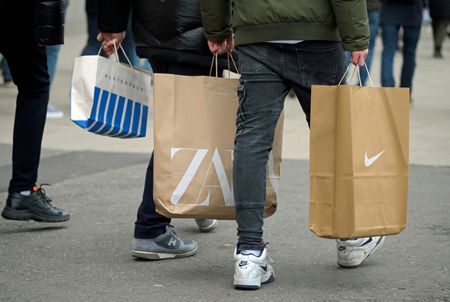By Maria Martinez
BERLIN (Reuters) -German inflation accelerated more than expected in September, rising for a second consecutive month and reaching the highest level since February.
German inflation rose to 2.4% in September, preliminary data from the federal statistics office showed on Tuesday. Analysts polled by Reuters had forecast EU-harmonised inflation increasing to 2.2% from last month’s 2.1%.
“Despite the weak economy in recent years, prices are still rising faster than the European Central Bank would like,” said Ralph Solveen, senior economist at Commerzbank.
Germany, Europe’s largest economy, is only just emerging from two consecutive years of economic contraction and will likely still be hit by the effects of U.S. President Donald Trump’s tariffs.
EURO ZONE INFLATION EXPECTED TO RISE
German inflation could give an indication of the developments in euro zone inflation, which is scheduled to be released on Wednesday. Inflation also accelerated in France, Italy and Spain.
Analysts expect September euro zone inflation to rise to 2.2% from last month’s 2.0%, which is the European Central Bank’s target.
The ECB left interest rates unchanged this month, remaining upbeat on the economy and indicating that it is in no hurry to cut rates again.
“Today’s German inflation data will catch the hawks’ attention, as it bolsters the argument for a high bar to yet another ECB rate cut,” said Carsten Brzeski, global head of macro at ING.
CORE INFLATION REMAINS STICKY
Germany’s core inflation rate, which excludes volatile food and energy prices, rose to 2.8% in September following three months unchanged at 2.7%.
“This proves to be more persistent than many had expected and warns that inflation risks in the medium term could be greater than some people think,” said Solveen.
The increase in the headline figure was because energy prices were only slightly lower than a year earlier, 0.7%. Food inflation fell to 2.1% in September from 2.5% in the previous month.
GERMAN MACRO DATA POINT TO DEFLATION
German retail sales unexpectedly fell by 0.2% in August, the federal statistics office said on Tuesday, dropping in four out of the five last months.
Data also showed on Tuesday that German import prices decreased by 1.5% year on year in August, continuing their decline since April.
The number of people out of work in Germany rose more than expected in September, labour office figures showed on Tuesday, as the job market struggles to recover in a continually weak economy.
“At least taken at face value, except for actual inflation data, today’s macro data from Germany has a distant taste of deflation risks,” Brzeski from ING said.
(Reporting by Maria Martinez and Ludwig BurgerEditing by Miranda Murray, Alexandra Hudson)











